Graduate
Hunt Fellowship Supports the Birds and the Brains
The second annual Earl (Buz) and Mary Lou Hunt Endowed Fellowship for Graduate Students in Psychology went to Caglar Akcay (Animal Behavior, Advisor: Michael Beecher) and Kristie Fisher (Cognition and Perception, Advisor: Miriam Bassok). Prof. and Mrs. Hunt created this fund specifically to support graduate students who were conducting research outside the purview of their advisor’s grants. Each fellowship provides stipend, tuition waivers, and health insurance for one academic quarter. Students receiving the Hunt Fellowship are typically in the last stages of completing their doctoral dissertations. Having this fellowship facilitates completion of the doctoral degree by eliminating the pressure of the extra work related to regular RA or TA positions.
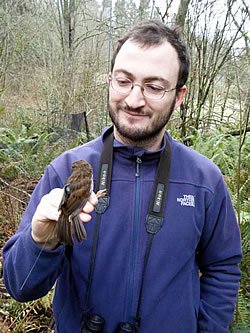 |
| Photo: Caglar Akcay holding a tagged bird |
Caglar’s research seeks to understand how animals determine who to trust in an evolution of cooperation. Male song sparrows (Melospiza melodia) show cooperation by acting less aggressively toward birds whose territories neighbor their own, which is known as the “Dear Enemy Effect.” Caglar’s dissertation examines how song sparrows learn which birds are trustworthy and which are not. He has already published the first studies from his thesis showing that sparrows do not have to experience aggressive behavior from another bird directly but can learn which birds to trust based on observation of their interactions with others. In his final dissertation study, Caglar is using the recording of birds who are intruding on another’s territory to determine whether the sparrows can distinguish between retaliation and unprovoked intrusion based on their experience with eavesdropping on their neighbors’ interactions. The findings will detail how territorial communication and cooperative acts works in nature, and these insights may be applicable to relationships in other living beings.
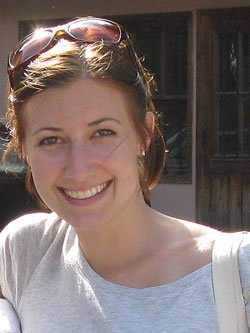 |
| Photo: Kristie Fisher |
Kristie’s dissertation research is concerned with how people integrate their "real world" knowledge with their math knowledge when solving applied math problems and how this integration is reflected in brain activity. By monitoring event-related brain potentials (ERP’s), Kristie has been able to show that humans can integrate concepts from their semantic and arithmetic knowledge as rapidly and fluently as they can comprehend sentences. She showed this by testing how people's brains respond when they are shown simple word problem sentences containing object sets and operations that are well matched versus problems in which they are not well matched. For example, adding 4 apples plus 6 oranges to equal 10 is fine, and the brain signals no errors. But a statement like 6 roses plus 2 vases equals 8 represents a misalignment with people's real-world experience (adding vases to roses rather than dividing roses into vases). The brain registers this mismatch with a P600 effect. Moreover, the mathematically correct answers at the end of these "misaligned" word problems elicit an N400 effect, which suggests that the presence of mismatched object sets made the mathematically correct answers seem incorrect. However, she found individual differences such that some research participants made an effort to ignore the objects in the word problem sentences, and no effects were found for this group. She is currently conducting follow-up studies on these differences. Kristie’s goal is to defend her dissertation later this quarter.
Thank you to Buz and Mary Lou for providing the means to our talented students in finishing their dissertations!
Link to the Previous Hunt Fellowship Recipients:
https://psych.uw.edu/newsletter/summer-2010/graduate/the-hunt-fellowship-at-work
Link to Introduction to Hunt Fellowship:
https://psych.uw.edu/about/pdf/Spring06.pdf
Huckabay Teaching Fellow is Radical
Andrew Fleming (fifth year child clinical student) has been a teaching assistant for most of his time in the program. After his first quarter, when he was assigned Psych 101, he declared that he wanted something more challenging. Since then, he has been placed in a variety of courses—Statistics, Psychobiology of Women, Developmental Psychology, and has served as the Clinic TA for three rigorous quarters. He was an ideal candidate for the University’s Huckabay Teaching Fellowship. He applied for and received the award last year.
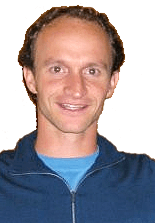 |
| Photo: Andrew Fleming |
The Huckabay Teaching Fellowship provides one academic quarter of financial support (including health insurance and tuition waiver) during which the recipient is to develop a unique college-level course from scratch under the guidance of a faculty mentor. Andrew proposed to develop a course in Radical Behaviorism under the mentorship of Profs. Bob Kohlenberg and Nancy Kenney. For someone who is always doing several things at once, Andrew’s quarter off from TAing was refreshing and enabled him to create his course without additional teaching pressures.
Behavioral theory purports that all behaviors, including thoughts and feelings, are products of an individual’s evolutionary and lifetime learning history. Behavioral change can be achieved by modifying the context and reinforcers in the environment. Andrew hopes that his students learn the theory underlying the behaviorist approach to psychology and learn how they can apply behavioral principles to effect change in their own behavior (and perhaps that of their significant others). Andrew’s class is heavily interactive, with examples coming from real life, making it fun and effective. Students submit weekly writings, engage in a “self behavior change project,” and also work together in small groups to creatively teach a behavioral principle to the class.
Outside of school, Andrew has a successful record of ambitious hobbies including chess (Shorecrest High School placed first in Washington from 1996-1998) and ultimate (Seattle Sockeye placed second at the 2010 World Ultimate Frisbee Championship in Prague). Andrew shows no signs of slowing down with his general exam coming up and preparing for internship applications this fall. Why not add rock climbing to the mix?
Andrew would like to express his gratitude to all those whose teaching mentorship and modeling has inspired him over the past several years, especially Nancy Kenney, Bob Kohlenberg, Corey Fagan, Laura Little, and Marsha Linehan.
Learn more about the Huckabay Teaching Fellowship:
http://www.grad.washington.edu/students/fa/huckabay/index.shtml
Spring Ahead with the Clinical Program
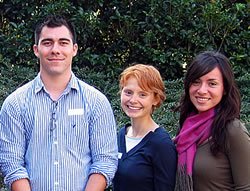 |
|
Child clinical:Rick Cruz, Kate Sullivan, Marissa Corona |
Clinical students in their fourth year participate in a spring research symposium, the Science-Informed Clinical Case Presentations (or SICP). Similar to the Department’s Research Festival, where clinical students present research talks during their second year, the students present case studies that integrate empirically-supported case conceptualizations, treatments, and outcome measures. Each case presentation is followed by discussion.
Clinical faculty, students, and outside supervisors attend and participate in an informal reception after the case presentations. It is a great opportunity for faculty to provide support, input and modeling for students in the seamless integration of science and practice.
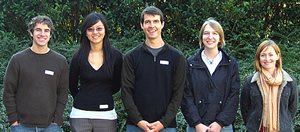 |
|
Adult clinical: Eric Pedersen, Sharon Hsu, Joel Grow, Erin Ward-Ciesielski, Sam Yard |
Due to the sensitive nature of the case studies, non-clinical guests are unable to attend. However, acknowledging the accomplishments of our clinical students is very important to the Department, and we applaud you for your continued work!
Link to Department’s Research Festival:
https://psych.uw.edu/graduate/current-students/research-festival
Link to the Clinical Area of the Department:
https://psych.uw.edu/graduate/areas/clinical
Accomplishments
Autumn quarter 2010:
Joel Grow (Adult Clinical student with G. Alan Marlatt) co-developed and co-led a five day residential professional training retreat in Mindfulness-Based Relapse Prevention. Joel worked on this project with post-doc Neha Chawla (UW '10), research scientist Sarah Bowen (UW '08), and Dr. Marlatt. Similar trainings were offered in Rochester, New York and in Joshua Tree, California in September and March. Joel also received the 2010 Association for Behavioral and Cognitive Therapies (ABCT) Mindfulness & Acceptance Special Interest Group (SIG) “Graduate Research Award” for his project Treatment Enactment in Mindfulness-Based Relapse Prevention. Joel gave a brief talk on the project at the ABCT convention in San Francisco in November 2010.
Research in Mike Beecher's lab conducted by Caglar Akcay (Animal Behavior student) on the "Dear Enemy Effect" between neighboring song sparrows was featured in BBC Earth News in October. (See more extensive descripton of Caglar’s research in the article on the Hunt Fellowships.)
Robert Askew received a UW Tobacco Studies Scholarship which provides advanced opportunities for education and training in tobacco prevention, research, treatment and policy. He is a first year Quantitative student with Brian Flaherty.
A number of students attended the 2010 Society for Neuroscience conference in San Diego. Andrew Bock and Robyn Laing (Behavioral Neuroscience students mentored by Jaime Olavarria), Robyn’s poster was titled Segregated Ocular Dominance Domains in Rat Visual Cortex: Anatomical and Physiological Evidence. Andrew’s poster was titled Critical Period for the Effects of Neonatal Enucleation on Callosal Connectivity and Water Diffusion Anisotropy in the Ferret Visual System. Lauren Graham and Earnest Kim (Behavioral Neuroscience students mentored by Jeansok Kim) also presented their research. Lauren's presentation was on Decision making: A unique form of cognition, or complex learning and memory? and Earnest's presentation was called Amygdala Modulates Foraging Behavior of Rats Living in an Unpredictable Fear Environment. First year Behavioral Neuroscience student Jessica Thomas (advisor, Ellen Covey) presented a talk called Stimulus-specific Adaptation in Specialized Neurons Within the Inferior Colliculus of the Big Brown Bat, Eptesicus fuscus.
Congratulations to our Autumn quarter 2010 Master's recipients: Kimberly Nelson and Sam Yard, both Adult Clinical students mentored by Jane Simoni.
The following students completed their general exams and advanced to candidacy for the Ph.D. in Autumn 2010: Marissa Corona, Christina Derbidge, Zach Ernst, and Sarah Racz.
Winter quarter 2011:
Jeremy Luk’s work on bullying appeared in the December 2010 issue of Prevention Science, a journal of the Society for Prevention Research. His study is the first to identify depression as a possible link to the relation between victimization and substance use among adolescents. “Previous research has shown that it (bullying) is associated with loneliness, depression and suicide. But no previous national studies have identified depression as an explanation for the relationship between victimization from bullying and substance use.” He is a Child Clinical student with Kevin King. The press release received considerable coverage, including five sources in India. http://tinyurl.com/spr-luk
Our Graduate Program Advisor, Jeanny Mai, received a 2010 Gradstar Award (Graduate Program Assistant Service Award) from the Graduate School last June. This award, established in 2009, pays tribute to the critical role Graduate Program Advisors play within graduation programs throughout the UW. “Our graduate students view Jeanny as the epitome of a proactive, supportive advisor.” (She shared this award with Frankye Jones of Electrical Engineering.)
Hong Nguyen (Adult Clinical student with Bill George) was awarded an APA Minority Fellowship Program, Mental Health and Substance Abuse Services Fellowship (MHSAS).
Jared Leclerc (Cognition and Perception student with Susan Joslyn), was honored by the 91st Annual Meeting of the American Meteorological Society. His presentation on The Effects of the Use of Uncertainty Estimates on Weather-Related Decision-Making was judged to be the best among the Sixth Symposium on Policy and Socio-economic Research presentations and was awarded a cash prize.
Sharon Hsu (Adult Clinical student with G. Alan Marlatt), received a grant from the Alcohol & Drug Abuse Institute for Stress and Coping Model of Alcohol Use Among Treatment-seeking Asian American Adults.
Recent alum Daniel Byrd’s (UW ‘10) report on race and the health care debate received coverage in the Huffington Post and the Oakland Tribune. He looked at racial resentment (symbolic racism) and Whites’ attitudes towards the health care law. Dan is currently the Research Director of The Greenlining Institute in Berkeley.
Amanda Gilmore (Adult Clinical student with Bill George), received an NRSA funded through NIAAA for her project Reducing Sexual Assault Risk and Alcohol Use in College Women. This award provides three years of funding, allowing Amanda to conduct her research without added teaching or research responsibilities.
 |
|
Photo: Prof. Peter Kahn with graduate students, Solace Shen, Heather Gary, and Jolina Ruckert (L-R) |
In early March, members of the Human Interaction with Nature and Technological Systems Lab (HINTS Lab) participated at the 6th ACM/IEEE International Conference on Human-Robot Interaction (HRI 2011). The conference is the premier venue for basic and applied human-robot interaction research, and this year, it was held at Lausanne, Switzerland. Led by Prof. Peter Kahn, who was also General Co-Chair of HRI 2011, developmental students Jolina Ruckert, Solace Shen, and Heather Gary each presented at the conference. Jolina presented her short paper titled Unity in Multiplicity: Searching for Complexity of Persona in HRI; Solace presented her short paper titled The Curious Case of Human-Robot Morality; and Heather presented a short paper titled The New Ontological Category Hypothesis in Human-Robot Interaction. For more information on the HINTS Lab's research, please visit their website: http://depts.washington.edu/hints/
The following students completed their general exams and advanced to candidacy for the Ph.D. in Winter quarter 2011: Sam Yard (Adult Clinical student with Jane Simoni) and Tom Soare (Animal Behavior student with Sean O’Donnell).
Spring quarter 2011:
Ashwin Bhandiwad (Animal Behavior student with Joseph Sisneros), served as Associate Director to the Second Annual Beneath the Waves Film Festival which took place in Mobile, Alabama in March 2011. Ashwin was responsible for selecting the films, coordinating the film schedule, and introducing the films before they were shown.
Liliana Lengua's lab had a strong showing of posters and presented a symposium at the 2011 Conference for the Society for Research in Child Development, in Montreal. Graduate students Cara Kiff (Components of Self-Regulation Differentially Predict Adjustment in Preschoolers), Lyndsey Moran (The Interaction Between Emotionality and Effortful Control in Early Social-Emotional Development), and Maureen Zalewski (Family Income, Maternal Depression and Parenting Behaviors that Account for or Buffer the Effects of Maternal Depression on Preadolescent’s Adjustment Outcome), each participated during the poster session. Maureen, Prof. Lengua, and Lyndsey also presented a symposium titled, Multi-Approaches to the Study of Children’s Emotion Regulation.
The Human Interaction with Nature and Technological Systems Lab (HINTS Lab) organized a panel at the 2011 Conference for the Society for Research in Child Development in Montreal, which brought together researchers interested in children's conceptions of and interactions with robots. The panel, Relationships with Robotic Others: Developmental Perspectives, was chaired by Prof. Peter Kahn. Heather Gary, a graduate student in the HINTS Lab, presented on children's conceptions of the humanoid robot Robovie in a talk entitled, Social and Moral Relationships with a Humanoid Robot.
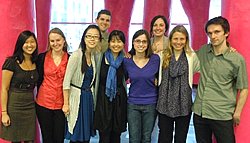 |
| Early Childhood Cognition Lab |
The Early Childhood Cognition Lab attended the 2011 Conference for the Society for Research in Child Development, in Montreal. Graduate students Jung-eun Yun (When a Friend Doesn't Look like Me: 12 Month Old Infants Overcome Race Bias and Prefer Social Individuals), and Kayla Upshaw each presented a poster, both are Developmental graduate students mentored by Jessica Sommerville. Jeff Loucks, a post doc in the lab, presented a poster and organized a panel titled Perceptual Tuning Across Domains: Mechanisms and Functions where he presented a talk on the development of action perception titled, Perceptual Tuning in Action Perception: Is motor experience the cause? In addition to supporting these projects, Prof. Jessica Sommerville presented a talk entitled Perception /Action Relations in Infant's Emerging Moral Sensitivity: The Cases of Fairness and Altriuism" during a symposium on moral development.
Research Mara Sedlins (Social Psychology and Personality student with Yuichi Shoda), contributed to at Microsoft was published in a paper and presented at the conference on Computer Supported Cooperative Work (CSCW) in Hangzhou, China, in March 2011. The research received coverage in online newsblogs (zdnet and Seattle PI).
Bjorn Hubert-Wallander (Cognition and Perception student with Geoff Boynton), received an NSF Graduate Research Fellowship for three years of funding. His grant is titled Individual Differences in Control of Selective Attention: The Case of Action Video Gamers.
Folk Beliefs about Human Genetic Variation Predict Implicit Race Bias was accepted for publication in Social Psychological and Personality Science (Plaks, Malahy, Sedlins, & Shoda, 2011). One of the studies is from Lori Malahy’s (Social Psychology and Personality student with Yuichi Shoda) dissertation research. Mara Sedlins is also a student in the same area, mentored by Yuichi Shoda.
GPAC representatives Ben Drury (Social Psychology and Personality student with Cheryl Kaiser and Sapna Cheryan), and Tom Soare (Animal Behavior student with Sean O’Donnell), successfully applied for GPSS Departmental Allocation money for revamping the communal graduate student spaces in Guthrie Annex 4. These funds are made available specifically for items that will benefit students and help build community within a department. Based on survey responses from psychology graduate students, this money will be used to purchase a white board and pool and table tennis equipment for the lounge, as well as a variety of new appliances for the kitchenette.
Jen Gerdts (Child Clinical student with Geraldine Dawson and Wendy Stone), was recently awarded a 2011-2012 Gatzert Child Welfare Fellowship. The Gatzert Child Welfare fellowship was established in the 1930s by the Bailey and Babette Gatzert foundation for Child Welfare. In accordance with the donor’s wishes, the funds are to be used to promote education for “the better care and treatment of children suffering from defects, either physically or mentally.” The one quarter fellowship will be awarded to support doctoral dissertation research in the field of child development with special reference to children with disabilities.
UW Psychology graduate students continue to have great presence at national conferences. During Vision Sciences Society (VSS) 2011 in Naples, Florida, the Department will be represented by the following Cognition and Perception students: Alec Scharff (advisor, John Palmer): Object Identification has Fixed Capacity: Evidence for Serial Processing in the Formation of Perceptual Objects, Jeff Lin & Bjorn Hubert-Wallander (advisor, Geoff Boynton): Reflexive Feature-based Attention in Visual Search, Erik Runeson (advisor, Scott Murray): Effects of Attention and Task on Responses in Visual Cortex, and Sungjun Joo (advisor, Scott Murray): Long-range, Pattern-dependent Contextual Effects in Early Visual Cortex.
Social Psychology and Personality students Ben Drury (advisors, Cheryl Kaiser and Sapna Cheryan), J.Oliver Siy (advisor, Sapna Cheryan), and Kerry Spalding (advisor, Cheryl Kaiser), will attend the Summer Institute for Social Psychology, at Princeton University. It is a two week program where selected graduate students take a specialized course in social psychology in a topic area unrelated to the graduate student's current research interest. This program is funded by the Society for Personality and Social Psychology (SPSP) and the National Science Foundation (NSF).
Clara Wilkins (Social Psychology and Personality student with Cheryl Kaiser) accepted a tenure track assistant professorship at Wesleyan University, in Middletown, Connecticut. It is a fabulous position, with outstanding research and teaching resources, and a great opportunity for Clara, who graduates with her Ph.D. this Spring quarter.
Marissa Corona (Child Clinical student with Ana Mari Cauce) received a 2011 American Psychological Association Student Travel Award. The travel award will help Marissa travel to the APA Convention in Washington, D.C. to present her research Longitudinal Associations Between Depression and Obesity Among Mexican American Children.
Tami Rigertink (Developmental student with Lynn Fainsilber Katz) completed a Quantitative Minor. She is our fourth student to complete the minor.
Eric Persen (Adult Clinical student with Mary Larimer) completed the Diversity Science Specialization. He is the third student to complete the specialization.
[Students who complete their Master’s degrees, general exams or defend their dissertation in Spring 2011 will be included in the Winter 2012 e-newsletter]

